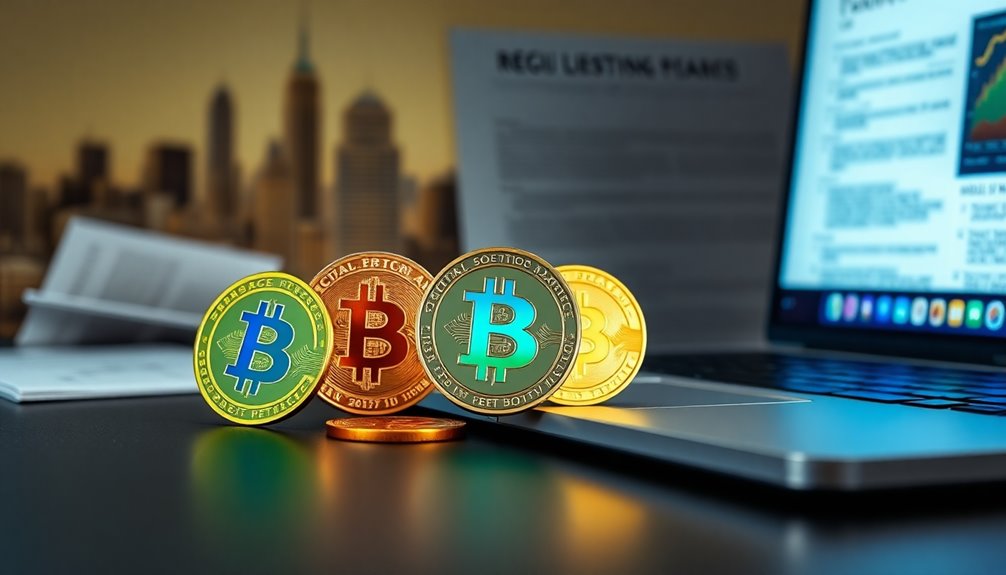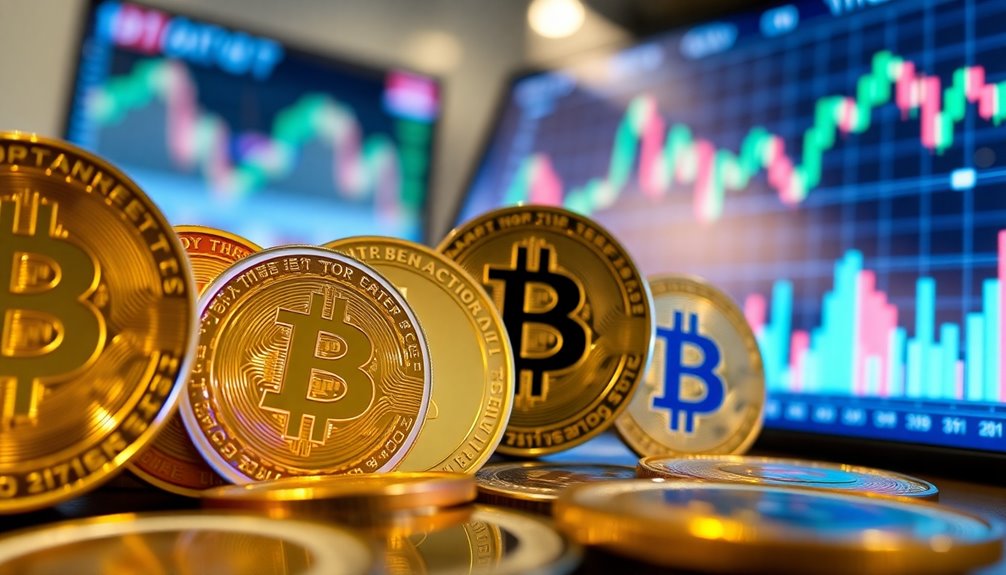While Bitcoin currently dominates the market, you'll find a flourishing world of alternative cryptocurrencies. With over 16,500 options available, altcoins like Ethereum, Cardano, and Solana offer unique features, from smart contracts to scalability. Trends such as AI integration and decentralized finance are shaping future investments. However, keep an eye on regulatory changes, as they may impact the status of these digital assets. Price volatility remains a key consideration, too—it can create both risk and opportunity. Exploring these aspects will unveil exciting possibilities in the crypto space that you won't want to miss.
Key Takeaways
- Over 16,500 cryptocurrencies exist, with altcoins like Ethereum, DOGE, and Cardano providing unique features and functionalities beyond Bitcoin.
- Decentralized finance (DeFi) and tokenized assets are emerging trends within the altcoin ecosystem, expanding investment opportunities.
- Regulatory frameworks are evolving, potentially classifying altcoins as securities, which may impact their trading and adoption.
- Price volatility in altcoins can be significant, influenced by market sentiment, liquidity, and external events like elections.
- Diversifying into altcoins can help investors manage risk and capitalize on the distinctive benefits each cryptocurrency offers.
Diverse Crypto Ecosystems Emerging

As the cryptocurrency landscape evolves, you're likely noticing the emergence of diverse ecosystems beyond just Bitcoin and Ethereum. With over 16,500 cryptocurrencies in circulation, the altcoin market is rich with opportunities. While Bitcoin dominates with over half of the market share, Ethereum holds almost 20%, showcasing the growing variety of use cases. Altcoins like DOGE, XRP, and newer players like Cardano and Solana are gaining traction through unique features and scalability. Some altcoins serve distinct purposes within the cryptocurrency ecosystem, highlighting their varied use cases. You'll find exciting trends in AI integration, tokenized assets, and decentralized finance (DeFi). Investing in altcoins can diversify your portfolio, offering options in NFTs and utility tokens, so now's the perfect time to explore these emerging opportunities.
Regulatory Changes Impacting Altcoins

The rapid growth of diverse altcoin ecosystems brings not only exciting opportunities but also significant regulatory challenges. You may find yourself navigating complex discussions about whether altcoins should be classified as securities, which would impose stricter regulations and tax implications on every transaction. If this happens, businesses accepting altcoins might need to overhaul their models to comply with new transparency and reporting requirements. Additionally, proposed frameworks like the Responsible Financial Innovation Act aim to clarify regulations, while global efforts like the EU's MiCA will influence standards worldwide. As these changes unfold, staying informed will be crucial to understanding how regulatory shifts impact your investments and participation in the altcoin space. Federal agencies are actively engaged in discussions surrounding the regulatory landscape for digital assets, which could lead to further changes in how altcoins are treated.
Price Volatility and Trading Volume

Price volatility in altcoins can often catch you off guard, especially when market sentiment shifts rapidly due to news or social media buzz. The dynamics of supply and demand play a crucial role here; concentrated supply can lead to sharp price movements, driven by changing investor behavior. When liquidity and trading volume are high, prices tend to stabilize as individual trades have less impact. However, lower liquidity means that single trades can cause significant price swings. Fears and uncertainties can exacerbate these fluctuations, triggering panic selling and herd mentality. Understanding these factors can help you navigate the unpredictable seas of altcoin trading, allowing for more informed decisions in your investments. Additionally, market liquidity is essential, as it directly influences how easily you can enter or exit positions without causing drastic price changes.
Corporate Investment Strategies

Navigating the unpredictable seas of altcoin trading can lead to significant opportunities for corporate investment strategies.
First, you need to understand the various types of digital assets and how they fit into your broader investment plan. Risk management is crucial; your treasury function should focus on preserving capital while ensuring you have enough liquidity to handle potential market fluctuations. Diversification reduces risk exposure by investing in multiple cryptocurrencies, which can help safeguard your investments against sudden market downturns. Additionally, consider implementing a Bitcoin IRA to benefit from tax-efficient growth for retirement savings.
Familiarize yourself with the evolving regulatory environment, as this makes investing in digital assets more mainstream. Consider partnerships and diversification to hedge against fiat currency fluctuations.
Look at companies like MicroStrategy, which successfully invested in Bitcoin to enhance returns. By embracing these strategies, you can position your organization to leverage the growing digital asset landscape effectively.
Election Outcomes and Market Reactions

As election outcomes unfold, you may notice significant market reactions in the cryptocurrency space, particularly with Bitcoin and altcoins.
Following Trump's election victory, Bitcoin surged past its previous all-time highs, jumping nearly 8% to above $75,000. Altcoins like Ethereum and Dogecoin also experienced substantial gains, reflecting a broader market rally. The surge is attributed to increased retail participation, which has historically contributed to bullish market momentum. Additionally, market trends indicate that investor confidence often swells in response to positive political developments.
The cryptocurrency market is highly sensitive to political uncertainty, often exhibiting volatility during elections. Historically, Bitcoin has performed well after past U.S. presidential elections, regardless of the winning party.
The crypto community anticipates a more favorable regulatory environment under Trump, aligning with his pro-crypto stance, which could lead to clearer rules and legislative changes that boost market confidence in the digital asset space.
Long-term Adoption Trends

With the increasing integration of cryptocurrencies into mainstream finance, long-term adoption trends are becoming increasingly evident.
You'll notice growing institutional interest, especially with Bitcoin and Ethereum spot ETFs making waves. This regulatory certainty gives cryptocurrencies legitimacy, attracting hedge funds and corporations, boosting market confidence. Additionally, the rise of larger market cap altcoins indicates a shift towards more stable investment options within the crypto space.
The global crypto user base has surpassed 420 million, with regions like South Africa leading the way. Technological innovations, such as decentralized finance and NFTs, are enhancing user experience and acceptance.
The cryptocurrency market is projected to climb to USD 6,293.2 billion by 2033, fueled by blockchain advancements and institutional investments.
As these trends continue, you can expect digital assets to secure a prominent place in traditional investment portfolios.
Frequently Asked Questions
How Do I Safely Store Alternative Cryptocurrencies?
To safely store alternative cryptocurrencies, consider your needs.
If you want convenience, use a hot wallet like Trust Wallet or Metamask for daily transactions, but be aware of security risks.
For higher security, opt for a hardware wallet like Ledger or Trezor, which keeps your assets offline.
If you prefer a hands-off approach, custodial wallets offer third-party management, but they come with their own risks.
Always back up your keys and stay informed!
What Are the Best Platforms for Trading Altcoins?
Did you know that over 5.5 million users trust Bitmart for altcoin trading in 180 countries?
When you're looking for the best platforms for trading altcoins, consider BYDFi for its low fees and no KYC requirements.
KuCoin offers a vast selection with over 700 cryptocurrencies.
If you're interested in derivatives, Bybit's strong security and low fees are appealing.
Coinbase also provides excellent fiat options and a massive user base for support.
Are There Any Tax Implications for Altcoin Investments?
Yes, there are tax implications for altcoin investments. The IRS classifies altcoins as property, so any gains or losses need reporting on your federal income tax return.
Short-term gains are taxed like ordinary income, while long-term gains have lower rates. You'll need to complete Form 8949 for capital transactions and include them on Form 1040.
How Do I Identify Promising Altcoins to Invest In?
When you're searching for promising altcoins, the excitement can quickly turn into uncertainty.
Start by evaluating market capitalization—larger cap coins offer stability, while lower cap coins come with higher risk but greater potential.
Look for solid project fundamentals, like a clear roadmap and a competent team.
Keep an eye on adoption trends and innovative technology.
With careful research, you can navigate the thrilling world of altcoin investments and find hidden gems.
What Are Common Security Risks Associated With Altcoins?
When dealing with altcoins, you need to be aware of common security risks.
Hacker attacks, like 51% and Sybil attacks, can compromise the network. Wallet vulnerabilities, such as weak encryption, might lead to significant fund losses.
Additionally, scams and phishing attempts can trick you into revealing sensitive information. Staying vigilant and implementing robust security measures is crucial to protect your investments and maintain confidence in the altcoin ecosystem.
Conclusion
As you venture into the vast ocean of alternative cryptocurrencies, remember that each wave brings new opportunities and challenges. Just like a skilled sailor, you'll need to navigate through the currents of regulatory changes and market volatility. Keep your eyes on the horizon for emerging trends and corporate investments that can guide your journey. By embracing this unpredictable sea, you might just discover treasures beyond Bitcoin, unlocking the true potential of a diverse digital world waiting to be explored.









